

Søren Kierkegaard. Søren Aabye Kierkegaard (/ˈsɔrən ˈkɪərkəɡɑrd/ or /ˈkɪərkəɡɔr/; Danish: [ˈsɶːɐn ˈkiɐ̯ɡəɡɒːˀ] ( )) (5 May 1813 – 11 November 1855) was a Danish philosopher, theologian, poet, social critic, and religious author who is widely considered to be the first existentialist philosopher.[5] He wrote critical texts on organized religion, Christendom, morality, ethics, psychology and philosophy of religion, displaying a fondness for metaphor, irony and parables.
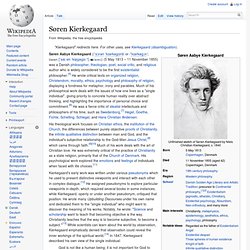
Much of his philosophical work deals with the issues of how one lives as a "single individual", giving priority to concrete human reality over abstract thinking, and highlighting the importance of personal choice and commitment.[6] He was a fierce critic of idealist intellectuals and philosophers of his time, such as Swedenborg,[7] Hegel, Goethe, Fichte, Schelling, Schlegel, and Hans Christian Andersen. Early years (1813–1836)[edit] Hubris. Hubris (/ˈhjuːbrɪs/, also hybris, from ancient Greek ὕβρις), means extreme pride or self-confidence.

Hubris often indicates a loss of contact with reality and an overestimation of one's own competence, accomplishments or capabilities, especially when the person exhibiting it is in a position of power. The adjectival form of the noun hubris is "hubristic". Ancient Greek origin[edit] In ancient Greek, hubris referred to actions that shamed and humiliated the victim for the pleasure or gratification of the abuser.[1] The term had a strong sexual connotation, and the shame reflected on the perpetrator as well.[2] In Greek literature, hubris usually refers to infractions by mortals against other mortals.
Aristotle defined hubris as shaming the victim, not because of anything that happened to a person or might happen to a person, but merely for that person's own gratification.[4] Hubris is not the requital of past injuries—that is revenge. Universal (metaphysics) The problem of universals is an ancient problem in metaphysics about whether universals exist.
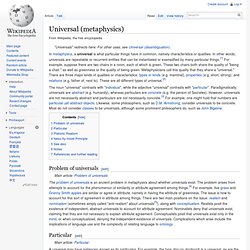
The problem arises from attempts to account for the phenomenon of similarity or attribute agreement among things.[4] For example, live grass and Granny Smith apples are similar or agree in attribute, namely in having the attribute of greenness. The issue is how to account for this sort of agreement in attribute among things. There are two main positions on the issue: realism and nominalism (sometimes simply called "anti-realism" about universals[5]), along with conceptualism.
Realists posit the existence of independent, abstract universals to account for attribute agreement. Nominalists deny that universals exist, claiming that they are not necessary to explain attribute agreement. A universal may have instances, known as its particulars. Martin Heidegger. Martin Heidegger (German: [ˈmaɐ̯tiːn ˈhaɪdɛɡɐ]; 26 September 1889 – 26 May 1976) was a German philosopher, widely seen as a seminal thinker in the Continental tradition, particularly within the fields of existential phenomenology and philosophical hermeneutics.

From his beginnings as a Catholic academic, he developed a groundbreaking and widely influential philosophy. His relationship with Nazism has been a controversial and widely debated subject. For Heidegger, the things in lived experience always have more to them than what we can see; accordingly, the true nature of being is “withdrawal”. The interplay between the obscured reality of things and their appearance in what he calls the “clearing” is Heidegger's main theme.
The presence of things for us is not their being, but merely their being interpreted as equipment according to a particular system of meaning and purpose. It has been suggested[by whom?] Transcendentalism. Transcendentalism is a religious and philosophical movement that developed during the late 1820s and '30s[1] in the Eastern region of the United States as a protest against the general state of spirituality and, in particular, the state of intellectualism at Harvard University and the doctrine of the Unitarian church as taught at Harvard Divinity School.

Among the transcendentalists' core beliefs was the inherent goodness of both people and nature. They believe that society and its institutions—particularly organized religion and political parties—ultimately corrupt the purity of the individual. They have faith that people are at their best when truly "self-reliant" and independent. It is only from such real individuals that true community could be formed. History[edit] Origins[edit] Transcendentalism is closely related to Unitarianism, the dominant religious movement in Boston at the early nineteenth century. Emerson's Nature[edit] So shall we come to look at the world with new eyes. Georg Wilhelm Friedrich Hegel. The birthplace of Hegel in Stuttgart, which now houses The Hegel Museum Georg Wilhelm Friedrich Hegel (German: [ˈɡeɔɐ̯k ˈvɪlhɛlm ˈfʁiːdʁɪç ˈheːɡəl]; August 27, 1770 – November 14, 1831) was a German philosopher, and a major figure in German Idealism.
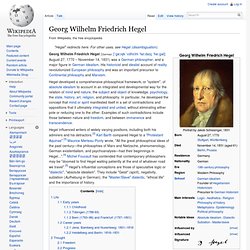
His historicist and idealist account of reality revolutionized European philosophy and was an important precursor to Continental philosophy and Marxism. Historicism. Historicism is a mode of thinking that assigns a central and basic significance to a specific context, such as historical period, geographical place and local culture.

As such it is in contrast to individualist theories of knowledges such as empiricism and rationalism, which neglect the role of traditions. Historicism therefore tends to be hermeneutical, because it places great importance on cautious, rigorous and contextualized interpretation of information, or relativist, because it rejects notions of universal, fundamental and immutable interpretations.[1] The term has developed different and divergent, though loosely related, meanings.
Elements of historicism appear in the writings of Italian philosopher G. B. Spacetime. In non-relativistic classical mechanics, the use of Euclidean space instead of spacetime is appropriate, as time is treated as universal and constant, being independent of the state of motion of an observer.
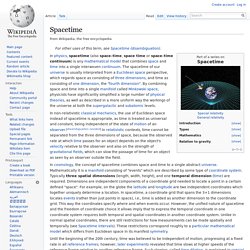
[disambiguation needed] In relativistic contexts, time cannot be separated from the three dimensions of space, because the observed rate at which time passes for an object depends on the object's velocity relative to the observer and also on the strength of gravitational fields, which can slow the passage of time for an object as seen by an observer outside the field. Until the beginning of the 20th century, time was believed to be independent of motion, progressing at a fixed rate in all reference frames; however, later experiments revealed that time slows at higher speeds of the reference frame relative to another reference frame. Determinism. Determinism is the philosophical position that for every event, including human action, there exist conditions that could cause no other event.

"There are many determinisms, depending upon what pre-conditions are considered to be determinative of an event. "[1] Deterministic theories throughout the history of philosophy have sprung from diverse and sometimes overlapping motives and considerations. Philosophy of physics. Stoicism. School of Hellenistic Greek philosophy Stoicism is a school of Hellenistic philosophy which was founded by Zeno of Citium, in Athens, in the early 3rd century BC.
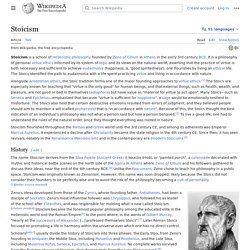
Stoicism is a philosophy of personal ethics informed by its system of logic and its views on the natural world. According to its teachings, as social beings, the path to eudaimonia (happiness) for humans is found in accepting the moment as it presents itself, by not allowing oneself to be controlled by the desire for pleasure or fear of pain, by using one's mind to understand the world and to do one's part in nature's plan, and by working together and treating others fairly and justly. Stoicism flourished throughout the Roman and Greek world until the 3rd century AD, and among its adherents was Emperor Marcus Aurelius.
It experienced a decline after Christianity became the state religion in the 4th century AD. Name[edit] Stoicism was originally known as ‘Zenonism’, after the founder Zeno of Citium. German philosophy. German philosophy, here taken to mean either (1) philosophy in the German language or (2) philosophy by Germans, has been extremely diverse, and central to both the analytic and continental traditions in philosophy for centuries, from Gottfried Wilhelm Leibniz through Immanuel Kant, Georg Wilhelm Friedrich Hegel, Arthur Schopenhauer, Karl Marx, Friedrich Nietzsche, Martin Heidegger and Ludwig Wittgenstein to contemporary philosophers. Søren Kierkegaard (a Danish philosopher) is frequently included in surveys of German (or Germanic) philosophy due to his extensive engagement with German thinkers.[1][2][3][4] Libertarianism (metaphysics) The term "libertarianism" in a metaphysical or philosophical sense was first used by late Enlightenment free-thinkers to refer to those who believed in free will, as opposed to determinism.[9] The first recorded use was in 1789 by William Belsham in a discussion of free will and in opposition to "necessitarian" (or determinist) views.[10][11] Metaphysical and philosophical contrasts between philosophies of necessity and libertarianism continued in the early 19th century.[12] Explanations of libertarianism that do not involve dispensing with physicalism require physical indeterminism, such as probabilistic subatomic particle behavior – theory unknown to many of the early writers on free will.
Temporal paradox. Temporal paradox (also known as time paradox and time travel paradox) is a theoretical paradoxical situation that happens because of time travel. A time traveler goes to the past, and does something that would prevent him from time travel in the first place. If he does not go back in time, he does not do anything that would prevent his traveling to the past, so time travel would be possible for him. However, if he goes back in time and does something that would cause him/her to not make a time machine he would not travel back in the first place causing him to make one then go back and not make one. A typical example of this kind is the grandfather paradox, where a person goes back in time to kill his grandfather before he had any biological descendant.
If they succeed, one of their parents would never exist and they themselves would never exist either. Ultimate fate of the universe. The ultimate fate of the universe is a topic in physical cosmology. Lucid dream. A lucid dream is any dream in which one is aware that one is dreaming. In relation to this phenomenon, Greek philosopher Aristotle observed: "often when one is asleep, there is something in consciousness which declares that what then presents itself is but a dream".[1] One of the earliest references to personal experiences with lucid dreaming was by Marie-Jean-Léon, Marquis d'Hervey de Saint Denys.[2] Skeptics of the phenomenon suggest that it is not a state of sleep, but of brief wakefulness.[15][16] Others point out that there is no way to prove the truth of lucid dreaming other than to ask the dreamer.[17] Lucid dreaming has been researched scientifically, with participants performing pre-determined physical responses while experiencing a lucid dream.[18][19] Scientific history[edit] Philosopher Norman Malcolm's 1959 text Dreaming[22] had argued against the possibility of checking the accuracy of dream reports.
Hearne's results were not widely distributed. Initiation[edit] REM sleep.